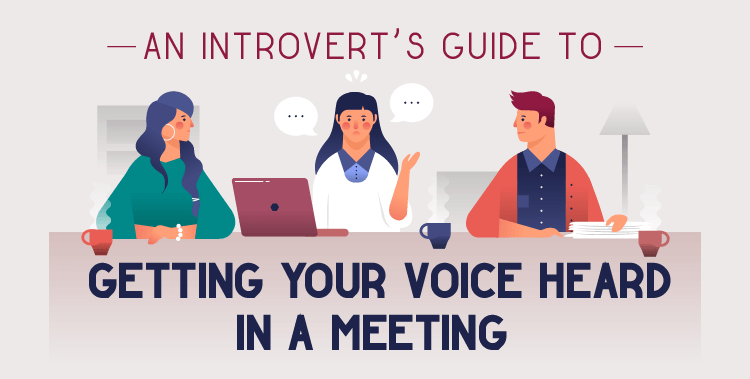Disclaimer: This post was originally published on our UK partner’s site.
When you’re an introvert, work meetings can feel like a necessary evil. Sure, they’re important, but you know that you work most effectively by yourself or in a one-on-one scenario. Even when you have something amazing to contribute, you don’t warm to the prospect of speaking up in front of all those people.
Take a new approach to those meetings, however, and you’ll discover that they can become not only bearable, but creative and productive. It’s all about capitalizing on your skills and qualities as an introvert and adapting them to the group environment.
One such quality is your special talent for research. Look through the agenda to start forming opinions in advance, and you’ll be ready to express your ideas while your extroverted colleagues are still finding their voice.
Of course, you’ll want to react to new information that comes up in the meeting, and a great way to do that is to take responsibility for summing things up. Introverts tend to put things in more concrete terms than extroverts. This means you can take time to process what’s being said during the meeting, and shape the outcome by voicing the conclusions and nailing down the call to action.
You don’t have to be outgoing to excel in group meetings. We’ve put together a handy guide to help you use your introverted nature to your advantage. And while we can’t guarantee that Monday morning meet-up will be fun, at least you’ll be able to contribute without feeling pressured to conform to the approach of your more sociable colleagues.
Learn to make the most of meetings and you’ll breathe new life into your working day. You have an amazing skill set – it’s time to start using those powers wherever they can help you.

Sources
Steele, D. (2010). Six Simple Ways to Prepare for a Meeting: It’s All About Them. fastcompany.com
Beukeboom, C. et al. (2012). The Language of Extraversion. journals.sagepub.com
Helgoe, L. (2010). Revenge of the Introvert. psychologytoday.com
Revelle, W. (1987). Personality and motivation: Sources of inefficiency in cognitive performance. sciencedirect.com
Roepe, L. (2017). 5 Steps To Get Your Voice Heard At Meetings. forbes.com
Cuddy, A. (2012). Your body language may shape who you are. ted.com
Ward, B. (2014). Advice from an introvert: It’s time to speak up. poynter.org
Stewart, C. (2017). 5 tips to help introverted leaders speak up and voice their opinions in meetings. cnbc.com
Martin, C. (1997). Extraversion or Introversion. myersbriggs.org
Embed This Image On Your Site (copy code below):






